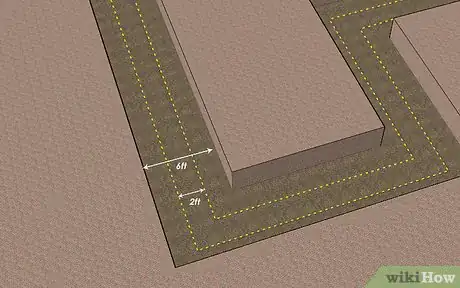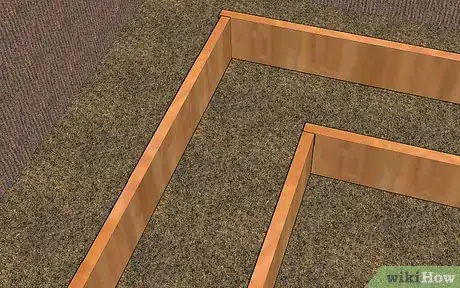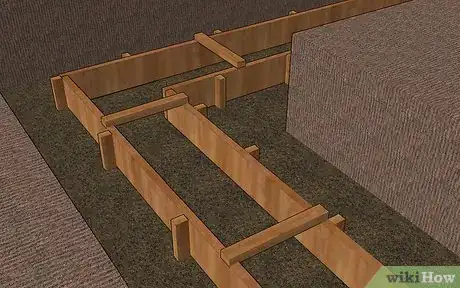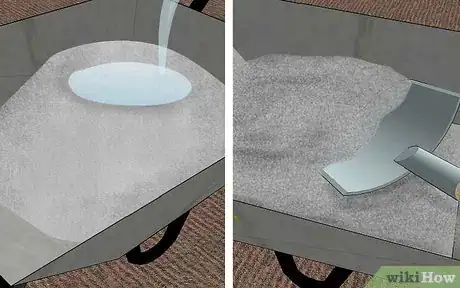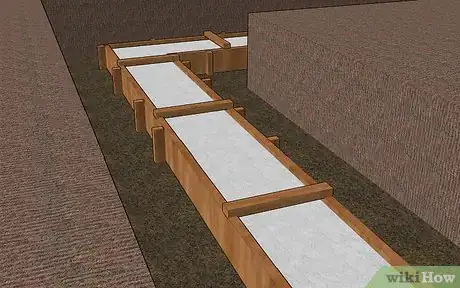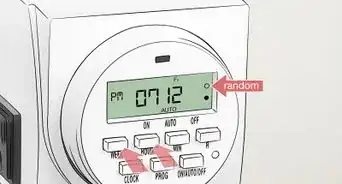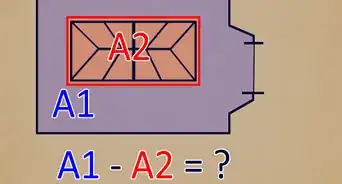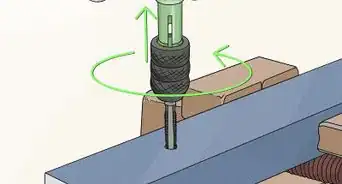This article was co-authored by Gerber Ortiz-Vega and by wikiHow staff writer, Sophia Latorre. Gerber Ortiz-Vega is a Masonry Specialist and the Founder of GO Masonry LLC, a masonry company based in Northern Virginia. Gerber specializes in providing brick and stone laying services, concrete installations, and masonry repairs. Gerber has over four years of experience running GO Masonry and over ten years of general masonry work experience. He earned a BA in Marketing from the University of Mary Washington in 2017.
There are 11 references cited in this article, which can be found at the bottom of the page.
This article has been viewed 600,237 times.
A concrete foundation is a base for a structure.[1] The type and size of concrete foundation you will need is based on the structure you will place upon it. You may need a concrete foundation for a fountain, or your patio furniture, or even for an air conditioner unit.
Steps
-
1Choose the type of foundation to build. The type of foundation depends on the area of the foundation will be located on and the type of structure that will be placed on it.[2]
- Shallow foundations are built on level ground and hard surfaces.[3] Shallow foundations are no more than 3 feet (0.91 m) (91.44 cm) deep and are used primarily for smaller, simpler projects like holding patio furniture, a fountain, or an air conditioning unit.
- Deep foundations are used for more complex projects.[4] Deep foundations are also used when soil conditions are poor or when building a structure on a hill. Deep foundations are more than 3 feet (0.91 m) (91.44 cm) deep and can have varying depths throughout. This type of foundation is suited for a shed or a detached garage.
-
2Set your footings 2 feet (0.61 m) (60.96 cm) across. Add 2 feet (0.61 m) (60.96 cm) on either side.[5] This properly spaces the form work and allows you the space you need to lay your foundation.Advertisement
-
3Align the 2 inch wide by 10 inch long (5.08 cm wide by 25.4 cm long) boards to build the forms for your footings. Situate and lay down the boards in the planned foundation shape and size.
-
4Square and level the form. Adjustments to the form can not be made after the concrete is poured. Because concrete is very heavy, be extra sure your formwork is strong and firmly in place.
-
5Make your concrete.[6]
- Dump the dry cement into the wheelbarrow.
- Add the water very slowly. Stir constantly.
- Stir the mixture thoroughly. Mix in just enough water so your cement is chunky. Don't let the mixture get too soupy.
- Remember to wear safety glasses, gloves, and a mask when mixing concrete.[7]
-
6
-
7Finish your concrete.[10]
- Let the concrete dry.
- Remove the forms after the concrete thoroughly dries. This will take at least 24 hours.
- Keep the concrete wet to avoid cracking if it's hot outside.[11] Soak it with a hose at least twice daily, three times if it is very hot outside.[12]
- Cover the pad if it looks like rain. Rain can cause depressions in the concrete and cause your foundation to be uneven.
Expert Q&A
-
QuestionHow deep does a concrete foundation need to be?
 Gerber Ortiz-VegaGerber Ortiz-Vega is a Masonry Specialist and the Founder of GO Masonry LLC, a masonry company based in Northern Virginia. Gerber specializes in providing brick and stone laying services, concrete installations, and masonry repairs. Gerber has over four years of experience running GO Masonry and over ten years of general masonry work experience. He earned a BA in Marketing from the University of Mary Washington in 2017.
Gerber Ortiz-VegaGerber Ortiz-Vega is a Masonry Specialist and the Founder of GO Masonry LLC, a masonry company based in Northern Virginia. Gerber specializes in providing brick and stone laying services, concrete installations, and masonry repairs. Gerber has over four years of experience running GO Masonry and over ten years of general masonry work experience. He earned a BA in Marketing from the University of Mary Washington in 2017.
Masonry Specialist & Founder, GO Masonry LLC It depends on how high you want to make the wall. For instance, if I need a two foot brick wall, I will pour a solid eight inch foundation. The foundation would be eight inches of pure concrete, and I would also put in rebars facing upwards in the concrete, and then I'll place the cinder blocks. After the cinder blocks and the foundation are ready, I can start laying in the bricks.
It depends on how high you want to make the wall. For instance, if I need a two foot brick wall, I will pour a solid eight inch foundation. The foundation would be eight inches of pure concrete, and I would also put in rebars facing upwards in the concrete, and then I'll place the cinder blocks. After the cinder blocks and the foundation are ready, I can start laying in the bricks. -
QuestionWhat is used to make concrete?
 jacob jabbenCommunity AnswerThe paste, composed of portland cement and water, coats the surface of the fine (small) and coarse (larger) aggregates. Through a chemical reaction called hydration, the paste hardens and gains strength to form the rock-like mass known as concrete.
jacob jabbenCommunity AnswerThe paste, composed of portland cement and water, coats the surface of the fine (small) and coarse (larger) aggregates. Through a chemical reaction called hydration, the paste hardens and gains strength to form the rock-like mass known as concrete. -
QuestionHow do I repair a block foundation?
 jacob jabbenCommunity AnswerFirst find what's wrong with the foundation. For example, if it is a damaged block, you need to remove the block and measure the length of the gap or missing block. Mix up molder and replace the new block, making sure it rests evenly.
jacob jabbenCommunity AnswerFirst find what's wrong with the foundation. For example, if it is a damaged block, you need to remove the block and measure the length of the gap or missing block. Mix up molder and replace the new block, making sure it rests evenly.
Things You'll Need
- Boards
- Shovel
- Wheelbarrow
- Cement
- Water
- Aggregate
- Trowel
References
- ↑ https://www.thisoldhouse.com/ideas/ground-foundations
- ↑ https://theconstructor.org/geotechnical/foundation-types-and-uses/9237/
- ↑ https://theconstructor.org/geotechnical/shallow-foundations-types/5308/
- ↑ https://theconstructor.org/geotechnical/types-of-deep-foundation/7252/
- ↑ https://pro.homeadvisor.com/article.show.Footing-Fundamentals.13700.html
- ↑ https://www.familyhandyman.com/masonry/pouring-concrete/how-to-properly-mix-concrete/
- ↑ Gerber Ortiz-Vega. Masonry Specialist. Expert Interview. 10 March 2020.
- ↑ https://www.familyhandyman.com/masonry/pouring-concrete/concrete-forms-and-pour-a-concrete-slab/
- ↑ https://www.familyhandyman.com/masonry/pouring-concrete/how-to-finish-concrete/
- ↑ https://www.familyhandyman.com/masonry/pouring-concrete/concrete-forms-and-pour-a-concrete-slab/
- ↑ Gerber Ortiz-Vega. Masonry Specialist. Expert Interview. 10 March 2020.
- ↑ https://www.bobvila.com/articles/curing-concrete/
- ↑ Gerber Ortiz-Vega. Masonry Specialist. Expert Interview. 10 March 2020.
- http://www.raftertales.com/home-improvement/how-to-build-a-concrete-foundation

